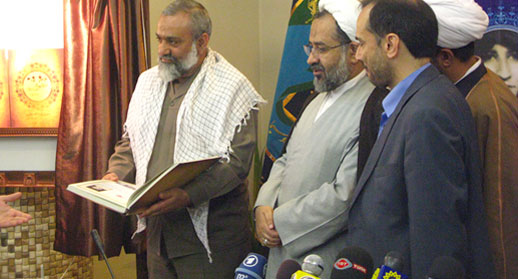| Commander of Iran's Basij (volunteer) forces Brigadier General Mohammad Reza Naqdi called on EU officials to drop support for the anti-Iran terrorist Mojahedin-e Khalq Organization (MKO) which has carried out numerous terrorist attacks against both Iranian and foreign nationals in the last four decades. |

"We should ask the Europeans who claim to be advocates of human rights that why they have supported these criminals," Naqdi said in a gathering here in Tehran on Tuesday.
He lashed out at the EU for backing up the group, and complained that the European countries have not extradited to Iran even one of the thousands of the MKO terrorists who reside in the Europe.
Referring to the crimes committed by the MKO against the innocent Iranian people, Naqdi reminded that members of the terrorist group have assassinated 12,000 innocent people, including 120 children and 170 women.
His remarks come after a recent call by the EU foreign policy chief, Catherine Ashton, on Iraq for ignoring the MKO's terrorist measures and activities.
The European Union has lately changed approach towards the terrorist MKO in a move to pressurize Iran to stop its progress in the civilian nuclear technology.
Some ranking members of the MKO who have had a role in the assassination of a large number of Iranian citizens and officials are currently living in France.
Before an overture by the EU, the MKO was on the European Union's list of terrorist organizations subject to an EU-wide assets freeze. Yet, the MKO puppet leader, Maryam Rajavi, who has residency in France, regularly visited Brussels and despite the ban enjoyed full freedom in Europe.
The MKO is behind a slew of assassinations and bombings inside Iran, a number of EU parliamentarians said in a recent letter in which they slammed a British court decision to remove the MKO from the British terror list. The EU officials also added that the group has no public support within Iran because of their role in helping Saddam Hussein in the Iraqi imposed war on Iran (1980-1988).
Many of the MKO members abandoned the terrorist organization while most of those still remaining in the camp are said to be willing to quit but are under pressure and torture not to do so.
A May 2005 Human Rights Watch report accused the MKO of running prison camps in Iraq and committing human rights violations.
According to the Human Rights Watch report, the outlawed group puts defectors under torture and jail terms.
The group, founded in the 1960s, blended elements of Islamism and Stalinism and participated in the overthrow of the US-backed Shah of Iran in 1979. Ahead of the revolution, the MKO conducted attacks and assassinations against both Iranian and Western targets.
The group started assassination of the citizens and officials after the revolution in a bid to take control of the newly established Islamic Republic. It killed several of Iran's new leaders in the early years after the revolution, including the then President, Mohammad Ali Rajayee, Prime Minister, Mohammad Javad Bahonar and the Judiciary Chief, Mohammad Hossein Beheshti who were killed in bomb attacks by MKO members in 1981.
The group fled to Iraq in 1986, where it was protected by Saddam Hussein and where it helped the Iraqi dictator suppress Shiite and Kurd uprisings in the country.
The terrorist group joined Saddam's army during the Iraqi imposed war on Iran (1980-1988) and helped Saddam and killed thousands of Iranian civilians and soldiers during the US-backed Iraqi imposed war on Iran.
Since the 2003 US invasion of Iraq, the group, which now adheres to a pro-free-market philosophy, has been strongly backed by neo-conservatives in the United States, who also argue for the MKO to be taken off the US terror list.
